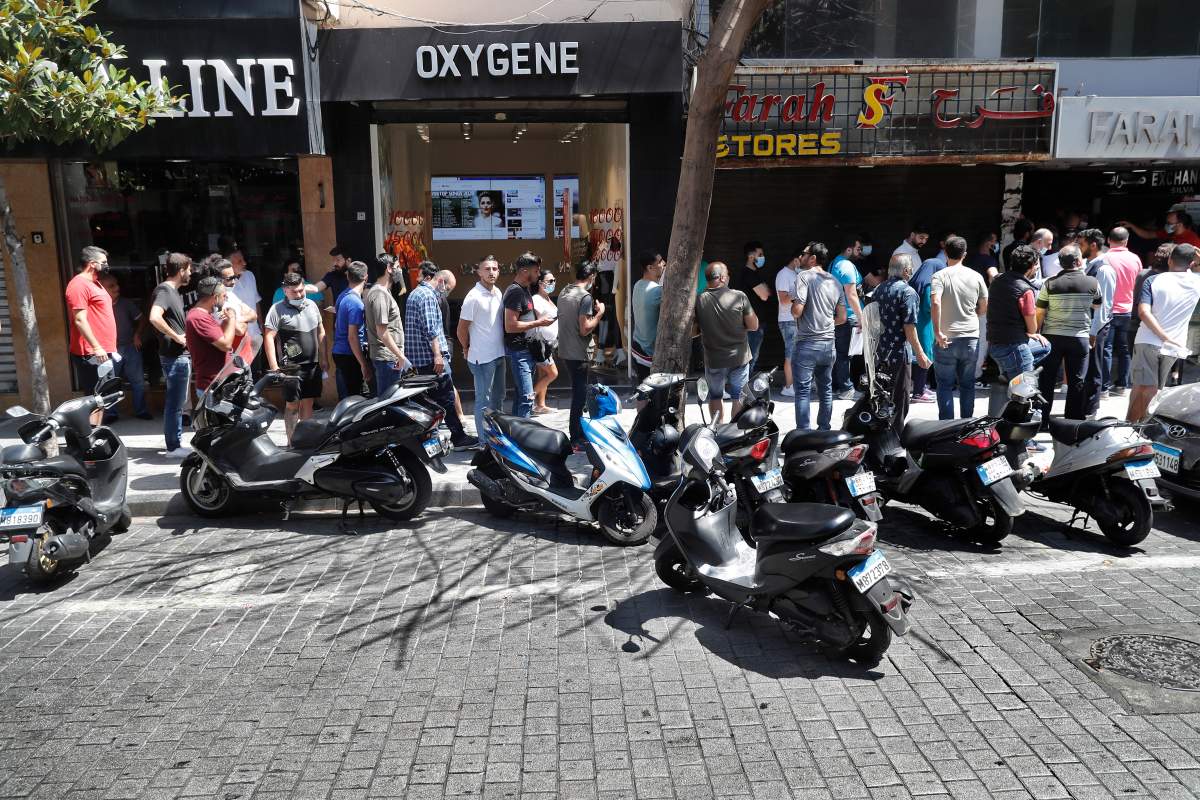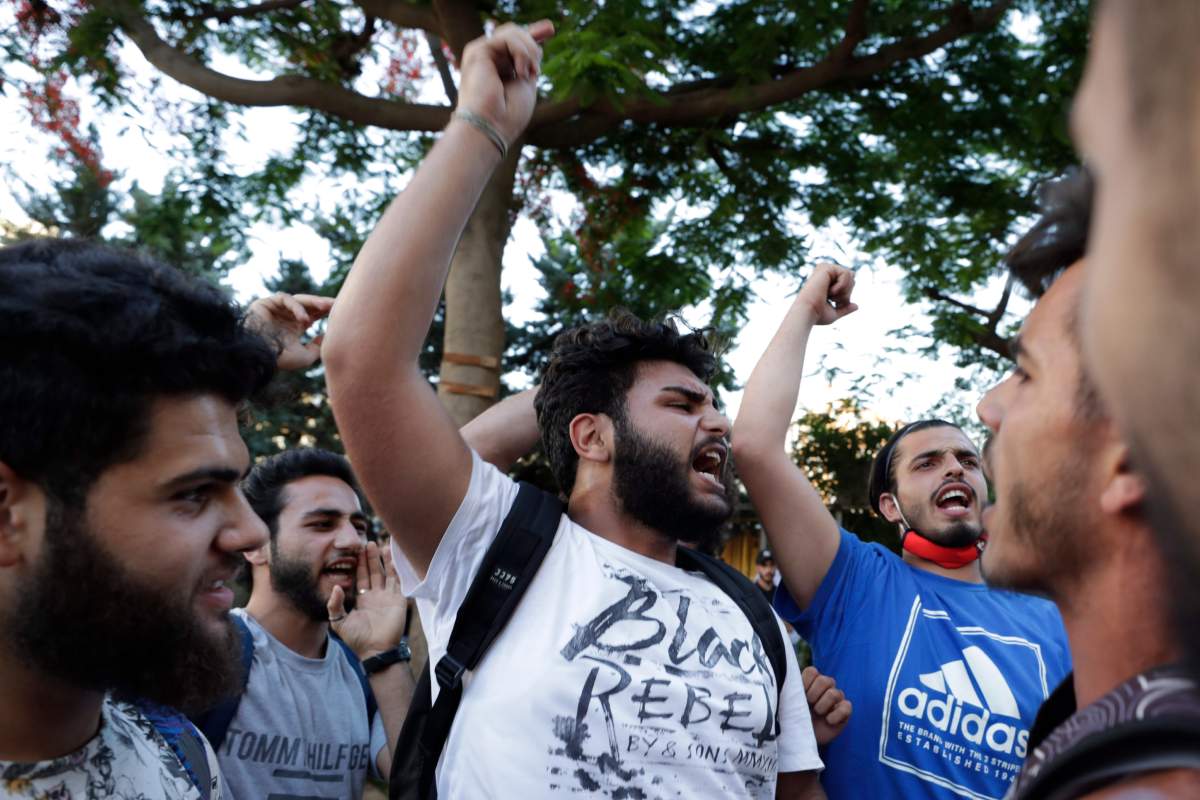Soha Zaiter has never seen the level of need that exists in Lebanon right now.

“We are facing challenges that we never thought of,” said Zaiter, executive manager of the Lebanese Food Bank.
“The people that used to be, let’s say ‘middle class,’ now they don’t exist anymore. Middle class has disappeared because everyone needs help.”
Everyone, that is, apart from the country’s rich and ruling class, who have been the focus of protests since last October.
Back then, Lebanese people were angry about proposed taxes on gasoline, tobacco and even WhatsApp voice calls.
Today, those demands seem almost quaint.
More and more families are now worried about feeding their children and finding basic items like diapers and baby formula.
The Lebanese pound (LBP) is effectively worth about six times less than it was a year ago when compared to the U.S. dollar.
A shortage of U.S. dollars means currency is traded on the black market, so even though the official exchange rate is LBP1,500 to one U.S. dollar, many businesses are currently paying LBP9,000.
It’s devastating for an economy that imports so much of what it consumes.
Flour, fuel and medicines now cost much more, even multiples of what they did last year, leading to hunger and regular power cuts.
The government raised the price of a subsidized loaf of bread by 33 per cent last month, triggering a new wave of protests.
WATCH (Feb. 11, 2020): Lebanon protesters clash with security, demand elections ahead of confidence vote

Prime Minister Hassan Diab has admitted the country risks “a major food crisis.”
In April, the World Bank estimated the economic crisis could put 45 per cent of the population into poverty, a doubling of poverty levels in Lebanon in less than a decade.
In some parts of the country, the figure is estimated to be well above 50 per cent.

Get breaking National news
A series of other factors will almost certainly make matters even worse.
Perfect storm
The sound of Lebanon’s woes has been largely drowned out as the planet deals with a pandemic.
The country’s crisis was not caused by COVID-19, but the coronavirus that causes it has made a very bad situation even worse, tipping the economy over the edge.
Many businesses that were already struggling to afford imported goods have been forced to close.
On top of that, the country has been unable to agree on a bailout deal with the International Monetary Fund (IMF).
These enormous loans come with strict austerity conditions that Lebanese politicians know they can’t afford to make.
“If they implemented (them), they would be done for politically,” said Sami Hamdi, a Middle East analyst and editor-in-chief of the International Interest.
“That’s what the IMF is proposing, is saving money, is cuts and the like; that will not please the citizens, even if it saves Lebanon from bankruptcy.”
Negotiations with the IMF have broken down, partly because the two sides can’t agree on the size of the bailout needed.
In fact, the Lebanese negotiation team can’t even agree among themselves.
Two members of the team have quit, apparently due to conflicting pressures from various sectarian elements within the Lebanese government.
“We are doing everything possible to thwart the project, and this is what makes us lose our necessary credibility, whether with or without the fund,” Alain Bifani said after he quit as director general of Lebanon’s Finance Ministry in June.
“We claim that we are committed to the plan that saves people’s money, but we give in to narrow interests and we do what will lead to waste people’s rights and money.”
WATCH (Jan. 25, 2020): Protesters doused by water cannons in Lebanon as demonstrations continue

One of the main reforms protesters have been calling for is an overhaul to the diverse country’s unique form of government.
The initial protests forced Saad Hariri to resign as prime minister last year, but the new government hasn’t enacted the types of changes many Lebanese citizens have been calling for.
In Lebanon, the prime minister must be a Sunni Muslim, the president must be a Maronite Christian and the Speaker of parliament must be Shia Muslim.
That compromise helped end the country’s civil war 30 years ago, but critics say a system designed to accentuate religious differences has led to decades of dysfunction and corruption.
Not to mention foreign interference and influence from Iran, Saudi Arabia and the West.
“There is no easy solution to this that does not require turning a blind eye to bolstering elements of Lebanese society that have been part of the problem,” said Hamdi.
“There is no international will at all, from any side, in order to allow the people to manifest their will to overhaul that system. Because that means Lebanon becomes (truly) independent.”
Syria sanctions
If all of that wasn’t enough, the recent imposition of harsh, new U.S sanctions against the Syrian regime of Bashar al-Assad will likely make matters worse again for Lebanon.
The Caesar Act primarily targets Syrian individuals, including the Assad family, military leaders and business executives.
It also places sanctions against supporters of the Assad regime, in particular the Lebanese militant group Hezbollah.
Political allies of Hezbollah formed part of the Lebanese coalition government formed in January 2020.
The porous border between Lebanon and Syria sees a large amount of official and black market trade.
It remains to be seen whether the Caesar Act will have any real effect on the links between Lebanon and the Assads, but it does seem likely to compound problems in Beirut.
Away from the geopolitics, normal Lebanese people have been forced to improvise just to survive, using the entrepreneurial spirit for which they’re known around the world.
Hassan Hasna set up a Facebook group to allow people to barter unwanted goods for food.
“A Lebanese person would say: ‘Yes, the economic situation is tough and the situation is deteriorating, but it doesn’t mean I want to humiliate myself and beg, I am willing to barter a piece of clothes in exchange for bread,'” said Hasna.
“I am proud of such people; they’re doing the impossible to survive and live with dignity.”
However, household items, just like dignity, are in finite supply.










Comments